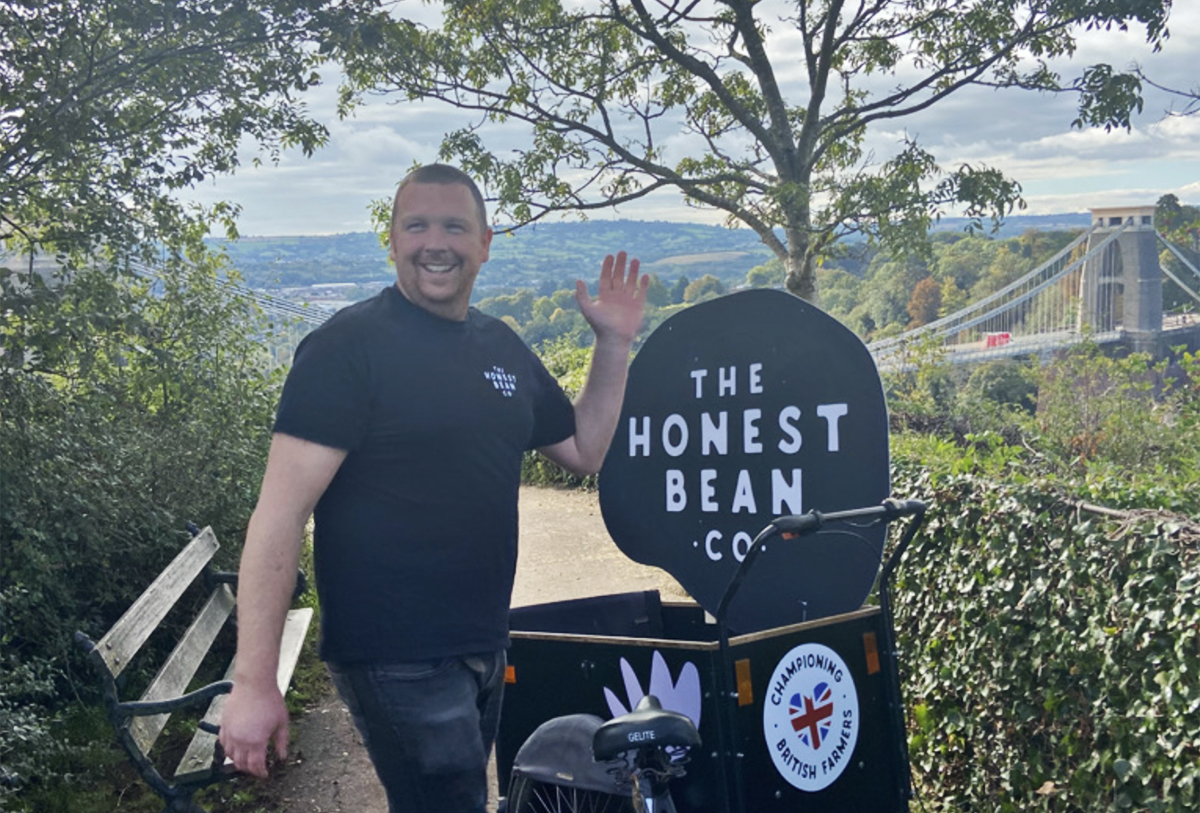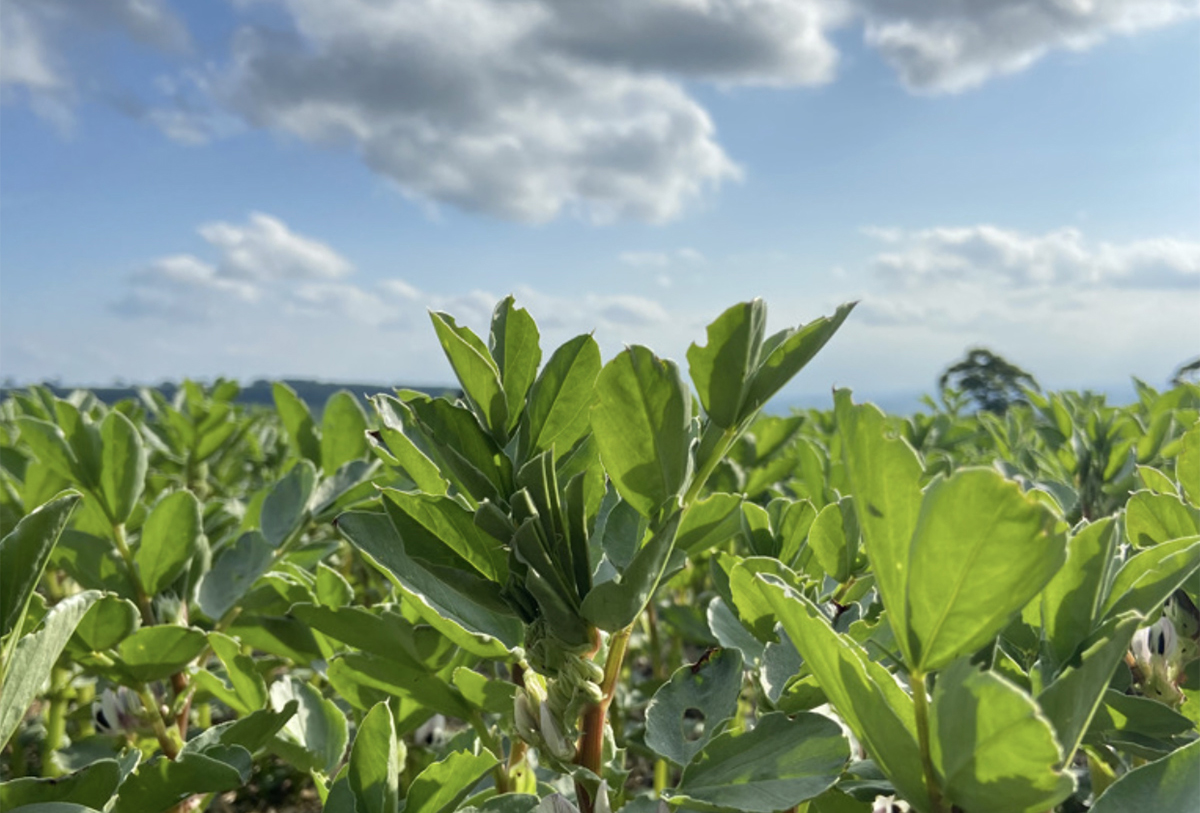July 5, 2022
The Honest Bean Co. is a small UK business with big dreams. Having grown out of Adam Palmer’s family farm, the company is on a mission to increase UK consumption of British-grown fava beans.


Co-founder Adam Palmer
I took over the farm 22 years ago. Linking farming, food and the end consumer has always been a passion of mine. Here in the UK, our neighbor was growing fava beans and, to be honest with you, I’d never even considered what you do with them. We realized that as a country, we export a huge portion of our food-grade beans, largely to the Middle East, while the animal feed fava beans stay here in the UK. The more I read into it, the more I realized that nobody, including me, really had a clue what they were or how to use them.
We decided to start with a hummus because we wanted to launch the brand with something that made fava beans accessible to people. While doing that, we were looking more into these beans, which are fantastic things; high in protein, high in fiber and really good for you, but underused.
As a company, we’re talking to people about why we should eat more pulses and the other crops we grow here in the UK. Everyone's trying to eat more plant-based diets and as farmers we have to try and cater to that but what we don't want to happen is we import every little bit that we need and have really complicated ingredients that don’t need to be there.
An awful lot of learning went into creating the hummus because we didn't know anything about the product. We started trying to make the hummus with the whole bean as you would get it out of the field, and it’s worth saying that it was fairly awful and wasn't something that anyone would want. But then we learned more about the processing and found out that most of these beans for human-grade are skinned and split. There's a company in Lincolnshire that does that, so they skinned and split the beans and gave us something that we could cook much more easily. Fava beans are a very different protein to chickpeas and break down slightly differently when you cook them.
There was a lot of trial and error in the cooking process, and it took us quite a long time to get it right. That said, once you get them cooked, it's just making a hummus to taste. We used our own compressed rapeseed oil, a bit of lemon juice, and garlic. Once we got to that stage, it was much easier, but working out how to use the bean was probably the hardest part.
Like I said, most people don't know what they are. But, if you get the time to tell consumers about fava beans, they’re actually really interested in learning more. So, we try to get out and do the festivals and shows and people are starting to understand a little bit more.
I think still the majority of people have never heard of them, but what many people want is a high hit of protein and fava beans offer that as well as high dietary fiber; they’re brilliant. So, once you start telling consumers this, they absolutely love it.

I come at this from the perspective of a farmer and a food producer. I think it's one of the reasons why I've always wanted to have that link between the farmer and the end producers because often, as farmers, we can get very disconnected with who is using our product and why. My view of farming is that we should be the people providing the food that people want to eat, rather than providing what we think we should be providing.
There's definitely a big shift towards plant-based eating but I don’t think it will ever shift completely. I'd like to see more people eating plant-based food for a few days a week with livestock farmers being paid the right money. This will probably mean that meat will become more expensive and will mean creating a quality product that's slow-growing and grass-fed. I'm a big believer in that. Rather than having a very small percentage of the world turn vegan, if you could have a very large percentage of the world cut their meat by half, I think it will make more of a difference in the long run.
They’re challenging to grow where we are. We're in quite a small microclimate up here, which means that we don't have a great growing season. But, I've been talking about soil health with beans and I thought ‘You know what, I'm going to put my money where my mouth is, have a go at this and actually see if we can grow them.’ So, we are growing them and using organic techniques as far as we can, to ensure that we get them harvested in the right amount of time.
We've not had to put nitrogen on them and we've got a great wheat crop following them, so if we can make it work, it just seems to be a bit of a no-brainer. However, we're only halfway through the season so far, so let's see how we go.
Sustainability is a big thing, and we've been trying to practice more regenerative agriculture in the last two or three years and especially so in the past 12 months. It is a bit of a challenge, but it's something that I believe in and I think something we need to practice if we’re going to protect our soil and keep going. We need to ensure we're protecting future generations and we need to start these practices now.
It’s a huge learning curve for us all, and it's not going to go well every year. But, I think it’s something that can be done quite simply and beans form a big part of that as far as soil health and nitrogen-fixing goes. It's just about using the right rotations and techniques to be able to manage what we're doing.
We need sustainable food sources here in the UK to feed ourselves without bringing in huge amounts of food from abroad. As a caveat, I understand that some things have to be imported, but what annoys me is when we import foods we can make here.
It’s all about education. I don’t think that people even really think about it. So, you've just got to start by educating people about what they are, why they're good, and how you use them and comparing that to what they're currently eating. I think there will be a shift, but I don't think we're quite at that point yet.
It's been a little mad. When we were first hit with COVID, we were very worried about how we would survive as a business. With the Honest Bean Co., we were still doing a lot of product development with the hummus, so it was in a very different place as a business. But, throughout lockdown, we actually developed our snack products, which hit the market in February 2021.
We started the fava bean challenge during lockdown: we sent out free bags of fava beans to people to encourage them to try making different things. So, that was quite interesting and got people involved while at home when they didn’t have a lot to do.
We were just trying to find ways of doing as much as we could in that time to set us up for the future and we actually kept trading all the way through. We shifted much of the business online but, as soon as the shops started to open up, we started picking up the retail trade again. In a small business, you just have to adapt to what's coming.
The snack product came out of the fava bean challenge, and my sister and business partner Zoe was at home daily, playing around with roasting them. We thought ‘There might be something here,’ so we went out and found a manufacturer who would be able to help us and started looking at flavors and seasonings. We were looking into 20 flavors, which came down to the four we launched. It involved trialing different seasonings, and coming up with the packaging, the design and printing.
We kicked it off in June 2020 and I remember it being a very big rush to launch in February 2021 but that's a very quick turnaround to put a product like that together. It was an interesting process; some fabulous people helped us along the way, and we wouldn't have been able to get it to that point without them.
The point of the snack is to eliminate the barrier of people not knowing what to do with fava beans and create a healthy, high-protein snack product that people can eat on the go.
The overall vision is getting more people to eat more fava beans in the UK and we would like to look at as many different ways as possible to get people to try them, with the hope that one day we don't export them anymore. We've got a bit of work to do before we get to that point, but one day!
Disclaimer: The opinions or views expressed in this publication are those of the authors or quoted persons. They do not purport to reflect the opinions or views of the Global Pulse Confederation or its members.